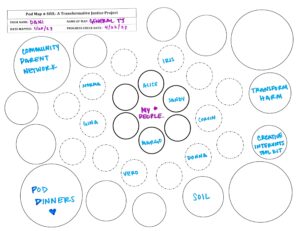What is Self-Care?
Self-care is when you take care of your own physical, emotional, and mental health and well-being. Examples of self-care include going to therapy, exercising, resting, and spending time with friends or family.
For many people – in particular, women, who have many responsibilities and demands in their lives at the same time – taking time for self-care often comes last. When possible, it is important to find ways to make yourself and your needs a priority. It’s easier said than done – not everyone has the same access to the resources and time for self care.
Shifting your focus from self-care to community care can allow you to connect with others and build dependable relationships that everyone is able to benefit from.
What is Community Care?
Community care is about how you support and show up for others. By promoting community well-being, you are helping to create a better environment for everyone to thrive in. Nakita Valerio defines it as “people committed to leveraging their privilege to be there for one another in various ways” and compares it to an extended family.
Examples of community care include:
- Protests;
- Food banks and soup kitchens;
- Interpersonal acts of support and kindness, like texting someone when they need to talk; cooking a meal for a friend who is grieving; or offering to accompany someone to a doctor’s appointment.
- Organized environments, like support groups, communal homes, and neighborhood groups.
“For communities of color, [community care] is especially necessary as we continue to navigate white supremacy in our daily lives…We need a space where we can tap in and receive healing, restorative care and love on each other.”
Donna Oriowo, PhD, LICSW, therapist
Tips for Community and Self Care
One of the most fundamental ways you can mutually support yourself and others in your community is to build a network of people you can trust. When things happen and you need help, you can’t always rely on certain institutions to support you in a timely manner. It is important to tap into your relationships and make connections with the people in your community so you can build a network of support to lean on in times of need.
Below are some strategies for doing this:
- Create a Phone Tree: Check on neighbors during a disaster, share essential information, or organize your community around a particular issue. Learn how to create one using this resource: Mutual Aid: How to Create a Phone Tree / Pod.
- Build Your Care Pod: Map out the people that you could call if you need help or support. You can have multiple pods for different purposes like a pod for people you can call for emotional support and/or a pod for those you contact if you experience or witness violence. Get started with your pod map here.

Sources
Curtis, Tiffany. “Community Care — Not Just Self-Care — Is Key to Our Collective Wellbeing.” LIVESTRONG.COM. https://www.livestrong.com/article/13771535-self-care-vs-community-care/.
Dockray, Heather. “Self-Care Isn’t Enough. We Need Community Care to Thrive.” Mashable. https://mashable.com/article/community-care-versus-self-care.
“Pod Map Worksheets.” SOILTJP. https://www.soiltjp.org/our-work/pods/podmapworksheets.

 Make the Switch to our new mailing list!
Make the Switch to our new mailing list!